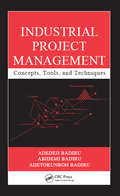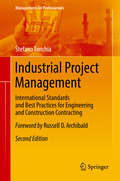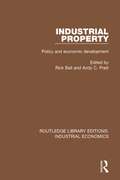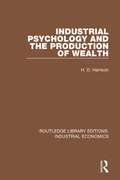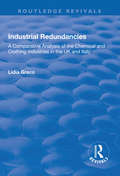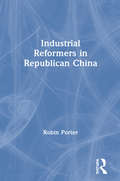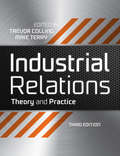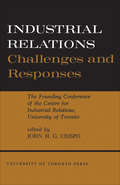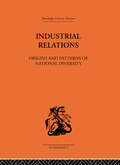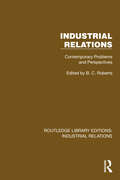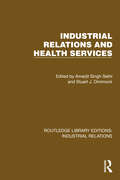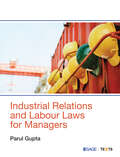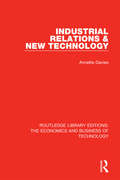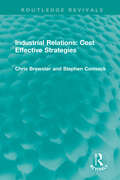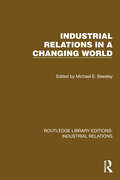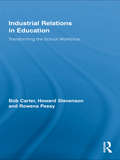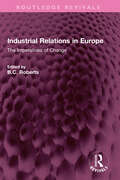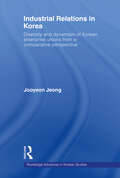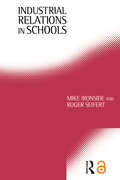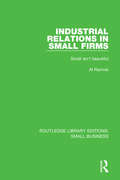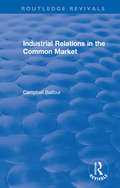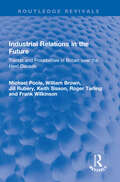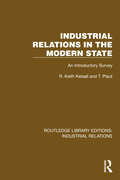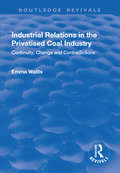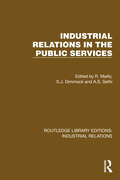- Table View
- List View
Industrial Project Management: Concepts, Tools, and Techniques
by Adedeji Badiru Abidemi Badiru Adetokunboh BadiruBook of the Month Award---Industrial Engineering Magazine Whatever your business, getting the work done on time can make or break your organization. The faster the world moves, the more this becomes important. The expanding utility and relevance of project management has lead to its emergence as a separate body of knowledge embraced by various disc
Industrial Project Management: Planning, Design, And Construction
by Stefano TonchiaThis book describes the principles and techniques in Project Management as applied to Engineering & Construction Contracts (ECC), conforming with relevant international standards (PMI - IPMA - ISO 21500), and pursuing a fully company-wide, process-based, multi-project approach.Uniquely, the book combines Project Management fundamentals with international contracting practices, which shape the planning, design and construction of large and complex works (such as plants, machinery, infrastructures and buildings) worldwide. The rigorous academic approach is mixed with the managerial contributions of Danieli, one of the world’s top three suppliers of plants and equipment to the metals industry.The book has been updated to reflect the PMBOK 6th edition (September 2017), presents best practices in PM from around the globe, and addresses new trends in PM such as Agile, SCRUM, etc. Lastly, a dedicated section covers the professional use of the reference software Microsoft Project.
Industrial Property: Policy and Economic Development (Routledge Library Editions: Industrial Economics #11)
by Rick Ball Andy C. PrattThis volume, first published in 1994, is the first collection of original research on the relationships between industrial property and economic development. The contributors, all specialists in their field, highlight the emerging conflicts between the users and the providers of industrial premises; conflicts that may undermine economic potential. The need for flexibility in the use and provision of industrial premises is explored in three contexts: the transformation of the urban fringe; the development of hi-tech premises; and the redevelopment of old or derelict premises.
Industrial Psychology and the Production of Wealth (Routledge Library Editions: Industrial Economics #12)
by H.D. HarrisonDuring the First World War, the necessity of increased production without increased human effort led to the practical investigation of the whole question by trained psychologists. This book, first published in 1924, deals with the methods they employed and with the results they obtained, and examines the wide-reaching effects which the application of these discoveries would have upon industrial organisation.
Industrial Redundancies: A Comparative Analysis of the Chemical and Clothing Industries in the UK and Italy (Routledge Revivals)
by Lidia GrecoThis title was first published in 2002. This work explores processes of corporate restructuring and employment change in two industrial areas, Teeside (in the north-east of England) and Brindisi (in the south-east of Italy), by drawing upon evidence from two industries - the chemical and clothing sectors.
Industrial Reformers in Republican China (Studies On Modern China)
by Robin PorterThis is the story of a dedicated group of foreign and Chinese reformers who tried, but failed, to solve China's intractable industrial problems over the three decades prior to 1949. It explores the complex rivalries of Chinese and foreigners against a backdrop of extreme nationalism.
Industrial Relations
by Trevor Colling Mike TerryThis revised edition of Industrial Relations: Theory and Practice follows the approach established successfully in preceding volumes edited by Paul Edwards. The focus is on Britain after a decade of public policy which has once again altered the terrain on which employment relations develop. Government has attempted to balance flexibility with fairness, preserving light-touch regulation whilst introducing rights to minimum wages and to employee representation in the workplace. Yet this is an open economy, conditioned significantly by developing patterns of international trade and by European Union policy initiatives. This interaction of domestic and cross-national influences in analysis of changes in employment relations runs throughout the volume.
Industrial Relations: The Founding Conference of the Centre for Industrial Relations, University of Toronto
by John H. CrispoIndustrial relations, which in the past have focused almost entirely on union-management relations, have recently been expanded to include such new areas of interest as manpower and poverty problems. At the University of Toronto a new Centre for Industrial Relations has been established, a research-oriented institution whose primary objective is to further scholarly investigations into all phases of industrial relations. To launch the new Centre a conference was held with distinguished Canadian and international authorities invited to discuss the challenges and responses for Industrial Relations in the next decade, from various points of view. This volume, based on the papers presented, will be a welcome contribution to knowledge in this challenging field.<P><P> In Part I, "An International Perspective," David A. Morse considers the conference's general theme in terms of its world-wide ramifications. Part II, "Collective Bargaining in an Age of Change," is devoted mainly to a discussion of the impact of industrial change on collective-bargaining institutions and practices. James R. Bright begins with a reminder that there are two schools of thought about the effect of automation upon such variables as skill and wage differentials. Then Frederick Harbison and Arnold R. Weber assess the recent record of collective bargaining: Professor Harbison provides a wide-ranging analysis of the performance of the American collective-bargaining system to date, and Professor Weber describes the effect of technological change upon the respective power of union and management, upon negotiating procedures, and upon the substantive results of collective bargaining. Harry W. Arthurs explores the role of law in coping with change, especially the technological variety. The third part of the volume, "On the Frontier of Industrial Relations," considers two of the many new industrial relations problems: Wilbert E. Moore, discussing the individual in an organizational society, asks for a reconsideration of the roles of institutional responses to the challenges posed by industrialization. Finally, there are two discussions devoted to one of the most pressing economic and social problems: poverty. The Honourable Maurice Sauvé, who, as Canada's Minister of Forestry, is in charge of the Agriculture Rehabilitation and Development Act, discusses the earnest response of governments to the challenge of poverty; Tom Cosgrove, discussing the United States "war on poverty," reviews the dimensions of the challenge posed by poverty in the United States and outlines the federal legislative response to date.<P> These provocative contributions should be received with great interest by representatives of labour, management, and government, as well as by those members of the public who are concerned with the problems of a growing industrial society.
Industrial Relations: Origins and Patterns of National Diversity
by Michael PooleThis comparative study of industrial relations provides an analysis of a wide range of phenomena, with a view to uncovering the origins of national diversity. It takes into account the notion of strategic choice, set within a series of constraints of environment, organizational and institutional conditions and power relationships. The book:* Covers a wide range of examples from the UK, USA, France, Germany Italy, Sweden, Eastern Europe, Latin America, India and Japan* Includes a comprehensive analysis of management and employers' associations, labour and trades unions* Examines the role of the state in comparative perspective
Industrial Relations: Contemporary Problems and Perspectives (Routledge Library Editions: Industrial Relations)
by B. C. RobertsIndustrial Relations (1968) discusses the impact of the changing industrial relations environment on the supply of labour, trade unions, management, collective bargaining, wage policy, factory level relationships, industrial social policy, the law, politics and public policy and its administration in the labour field.
Industrial Relations and Health Services (Routledge Library Editions: Industrial Relations)
by Amarjit Singh Sethi Stuart J. DimmockIndustrial Relations and Health Services (1982) provides a comparative treatment of labour and industrial relations in health services in Canada, Britain and the USA. While there are differences between the systems in these three countries, such differences illuminate the particular responses and policies that need to be made in varying circumstances. It is written by practitioners as well as academics, so that it will provide practical insights into bargaining strategies, labour relations issues and conflict resolution techniques.
Industrial Relations and Labour Laws for Managers
by Parul GuptaA lucid and exemplary introduction to Indian labour laws and a thorough discussion on the legislations dealing with industrial relations and labour issues. Aiming to provide the readers with an understanding and knowledge of labour laws, this textbook presents a collection of legislations dealing with industrial relations, wages, work conditions, and social security, and legislations regulating the employment of women and children in industrial activities. It focuses on the application of labour laws to and within businesses, and deals with legal postulations from the perspective of a manager. By including a number of relevant cases and caselets highlighting various labour issues of industrial units across the country, Industrial Relations and Labour Laws for Managers helps students of human resource management as well as HR professionals to understand the legal implications in a relatable way. Key Features • Comprehensive coverage of labour and industrial relations laws along with contemporary developments • Each act supported by carefully curated cases to exemplify the practical facets and their implications • Each case followed by judgement and explanation unveiling the application of the legal concept • Each chapter aided by objective and descriptive exercises and case-based questions to aid teaching and learning in a classroom situation
Industrial Relations and New Technology (Routledge Library Editions: The Economics and Business of Technology #10)
by Annette DaviesNew technology arguably provided the greatest challenge to industrial relations since the formation of unions. The problems raised led to a whole range of responses - from rejection of the new technology to acceptance fo the change with management and workers making new (and sometimes unheard of) agreements. This book, originally published in 1986 and based on extensive original research, examines the changes in industrial relations which the new technology of the 1980s caused, analysing the implications for the workforce and the reactions of the management and trade unions to the challenges.
Industrial Relations: Cost Effective Strategies (Routledge Revivals)
by Chris Brewster Stephen ConnockThe economic recession of the 1980s changed the face of industrial relations in Britain. Originally published in 1985, this book brings together all the major developments from that time and examines organizational strategies in industrial relations from a cost-effectiveness standpoint. Contemporary issues, ever more relevant, such as flexible working patterns, are discussed in relation to the conflicting demands of unions and management. Appropriate courses of action are discussed, with many examples of how new ideas were put into practice.
Industrial Relations in a Changing World (Routledge Library Editions: Industrial Relations)
by Michael E. BeesleyIndustrial Relations in a Changing World (1975) shows how industrial relations embrace very deep-rooted attitudes and institutions, and that change, if it is to be radical, is slow. This book exposes long-term trends underlying developments in the 1970s, emphasising the importance and variety of objective industrial conditions that condition bargaining, the capacity of bargaining machinery to absorb change, the long-standing ideology inherent in the social contract, and the gradual emergence of a multinational dimension in trade union affairs.
Industrial Relations in Education: Transforming the School Workforce (Routledge Studies in Employment and Work Relations in Context)
by Bob Carter Howard StevensonAll phases of education from pre-school to post-compulsory, in virtually all parts of the world, have experienced unprecedented reform and restructuring in recent years. Restructuring has largely been driven by a global agenda that has promoted the development of human capital as the key to economic competitiveness in the global market. This book adopts an inter-disciplinary approach drawing not only on education research but also from the fields of industrial sociology, management studies and labour process theory to locate the reform agenda within a wider picture relating to teachers, their professional identities and their experience of work. In doing so the book draws on critical perspectives that seek to challenge orthodox policy discourses relating to remodelling. Illustrating of how education policy is shaped by discourses within the wider socio-political environment and how unionization and inter-organizational bargaining between unions exerts a decisive, but often ignored, influence on policy development at both a State and institutional level, this book is a must read for anyone researching or studying employment relations.
Industrial Relations in Europe: The Imperatives of Change (Routledge Revivals)
by B. C. RobertsFirst published in 1985 Industrial Relations in Europe examines the development of trade unions and their relations with the employers and employers’ organisations in a number of Western European countries in the 1980s. The shared characteristics of these systems are common heritage of political democracy, market economies, the right of employers to manage the business for which they are responsible and the right of employees to belong to unions which are free to bargain and to seek political goals which will advance the interests of their members. With case studies from Denmark, Germany, France, Great Britain, Norway etc. the volume showcases the major structural changes brought about by technological, economic and social factors which had significant implications for trade unions and traditional patterns of industrial relations. A major response was the erosion of centralized processes of decision making and a return to the individual, local initiative and an increased interest in entrepreneurship. This book is a must read for scholars of political economy, industrial economy and economics in general.
Industrial Relations in Korea: Diversity and Dynamism of Korean Enterprise Unions from a Comparative Perspective (Routledge Advances in Korean Studies)
by Jooyeon JeongA key factor in Korea's economic success is the nature of industrial relations in Korean business and industry. Joo-Yeon Jeong presents a comprehensive survey of the current state of industrial relations in Korea. He shows how union membership has changed over recent decades, and how the focus of bargaining has widened from purely financial considerations to include a much wider range of issues including, principally, issues related to job security. In addition, the book considers the role of government in shaping the legal and institutional environment, and of employers, who have taken a more aggressive role towards unions since the mid-1990s.
Industrial Relations in Schools
by Mike Ironside Roger SeifertThe subject of industrial relations is intimately connected with the nature of schooling - in particular, the teacher trade unions have played and will continue to play a crucial role in shaping the school system - yet this subject has been virtually neglected in educational literature. Mike Ironside and Roger Seifert's book redresses this balance and unravels the complex issues surrounding the employment and management of teachers. Recent changes in education have had massive implications for the way in which our education system is organised. In the light of recent events, this book questions who controls or ought to control schools, focusing on the government, Department of Education, LEA's, head teachers, school governors, parents and teaching unions. The authors argue that in order for schools to continue to function, industrial relations must be given priority, including the development of a proper framework for negotiation and the resolution of conflicts.
Industrial Relations in Small Firms: Small Isn't Beautiful (Routledge Library Editions: Small Business)
by Al RainnieOriginally published in 1989, this book analyses the economic and political position of the small firm in the 1980s, and in particular the relationship between small and large firms in an advanced capitalist economy. Focusing on the printing and clothing industries, it examines the industrial relation practices in these two contrasting sectors and shows that apparent industrial relations harmony – for example, the lack of strikes – should be put down to the powerlessness of the workforce rather than to contentment.
Industrial Relations in the Common Market (Routledge Revivals)
by Campbell BalfourOriginally published in 1972, Industrial Relations in the Common Market is a comparative study of the members of the Common Market, exploring the range of industrial relations and some of the contemporary issues and problems that they faced. The book provides a comprehensive description of the Common Market, its economic growth and the diverse economies of the member countries. It also examines political parties and trade unions, and deals with the themes of collective bargaining, incomes policy, law and labour relations, industrial democracy, labour mobility and social security. Industrial Relations in the Common Market is an excellent insight into the history of industrial relations within this economic community.
Industrial Relations in the Future: Trends and Possibilities in Britain over the Next Decade (Routledge Revivals)
by Michael Poole William Brown Jill Rubery Keith Sisson Roger Tarling Frank WilkinsonFirst published in 1984, Industrial Relations in the Future highlights probable developments in Britain’s system of industrial relations into the 1990s. It also provides a basis for further and detailed analysis and debate of issues central to the nation’s future. Written by distinguished scholars in their respective fields, the three main sections give reviews from three contrasting traditions- mainstream industrial relations, industrial sociology and management, and labour economics. These accounts are highly complementary in the ways in which, in each and every case, issues of collective bargaining, managerial strategy and union response, and the behaviour of governments are all set against a broad backcloth of economic, political, and social changes. The authors see the ultimate outcome as depending greatly on the policies and types of action of organised labour, managements and governments, and possibly of wider social movements as well. This book will be an essential read for scholars and researchers of labour economics, industrial sociology, economics, and public policy.
Industrial Relations in the Modern State: An Introductory Survey (Routledge Library Editions: Industrial Relations)
by R. Keith Kelsall T. PlautIndustrial Relations in the Modern State (1937) provides an introduction, as objective as possible in character, to the differing policies of 1930s liberal and totalitarian states in the matter of industrial relations. The period was the height of worker struggles around the world, as modern labour policies were developed against a backdrop of intense political upheaval.
Industrial Relations in the Privatised Coal Industry: Continuity, Change and Contradictions
by Emma WallisThis title was first published in 2000: This book describes and accounts for the patterns of industrial relations which have emerged in the UK coal industry since privatization in 1994. In so doing, it also addresses wider issues relating to industrial relations and ownership. Labour relations practices currently evident within the industry are compared with those which prevailed during the final years of nationalization, and a series of case studies demonstrates that both continuity and change are visible. Whilst continuity with the patterns of labour relations established during the final decade of public ownership is shown to have had negative implications for organized labour within the industry however, the changes associated with privatization are demonstrated to have been a more ambivalent force. This book concludes that privatization has had a significant influence upon industrial relations within the industry, and that organized labour has in general been detrimentally affected by these developments.
Industrial Relations in the Public Services (Routledge Library Editions: Industrial Relations)
by R. Mailly S. J. Dimmock A. S. SethiIndustrial Relations in the Public Services (1989) assesses the changes in industrial relations following Thatcher’s 1979 election in three particular parts of the public sector: local authorities, the national health service and the civil service. It considers the effects of the changing ‘political contingency’ on industrial relations, and discusses the trade union responses and the impact of the new conditions on bargaining.
